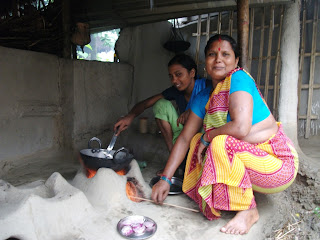Leela Devi, age 36, makes her way back home along the narrow lanes of Simariya village in Bihar as the evening sun descends into fields of harvest wheat. Her life will never be the same again. From barely being able to make the ends meet, her life is taking a turn for the better making her more self sufficient. Heifer International India in association with Society for Advancement of Tribes, Health, Education and Environment (SATHEE) is working for many such people and families in Bihar and other States of India. Leela Devi belongs to that fraction of community, which has been surviving amidst isolation, oppression and exploitation along with acute poverty-stricken conditions for a long time.
 Leela Devi has two twin sons, Luv and Kush, and two daughters named Priyanka (seen in the picture) and Suman. While her husband, Umesh Prasad does masonry work, she cooks the mid day meal provided to the school children. Leela Devi has one cow, a calf and two goats. She is one of the most active members of the Project Management Committee (PMC) and has received trainings on 12 Cornerstones, self-help group management, gender justice and improved animal management. By the means of these trainings, Leela and her husband feel encouraged and empowered to lead a balanced and self sustainable lifestyle.
Leela Devi has two twin sons, Luv and Kush, and two daughters named Priyanka (seen in the picture) and Suman. While her husband, Umesh Prasad does masonry work, she cooks the mid day meal provided to the school children. Leela Devi has one cow, a calf and two goats. She is one of the most active members of the Project Management Committee (PMC) and has received trainings on 12 Cornerstones, self-help group management, gender justice and improved animal management. By the means of these trainings, Leela and her husband feel encouraged and empowered to lead a balanced and self sustainable lifestyle. Apart from the regular sources of earning, Leela Devi has been able to earn and save more money by means of selling 14 litres of cow's milk every week. The family's nutrition intake has also gone up due to consumption of this milk. She, along with her family, currently lives in a thatched bamboo hut but because of the improved circumstances, she has been able to earnestly save some money to build a safe concrete house. Apart from learning the importance of nutrition, saving, sharing, caring and cleanliness, Leela Devi and her husband have also learned to manage their livestock's safety, health and productivity. They have learned to live a balanced and self-reliant life by optimally utilizing the available resources.
Apart from the regular sources of earning, Leela Devi has been able to earn and save more money by means of selling 14 litres of cow's milk every week. The family's nutrition intake has also gone up due to consumption of this milk. She, along with her family, currently lives in a thatched bamboo hut but because of the improved circumstances, she has been able to earnestly save some money to build a safe concrete house. Apart from learning the importance of nutrition, saving, sharing, caring and cleanliness, Leela Devi and her husband have also learned to manage their livestock's safety, health and productivity. They have learned to live a balanced and self-reliant life by optimally utilizing the available resources.They are one of the 4000 odd families whose food security, livelihood promotion and empowerment is taking place on a regular basis as an impact of the Heifer Project.
Editor's note: This post is the first from India in a new series that follows the progress of specific families, starting at the beginning of their work with Heifer. Initially, this series will focus on our programs in Asia/South Pacific, where our colleagues have chosen one family in each region in the countries where we work and will bring us quarterly updates.